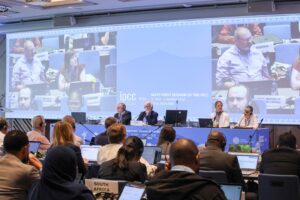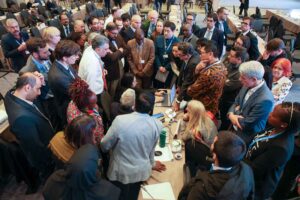The Intergovernmental Panel on Climate Change’s forthcoming special report on climate change and cities has more women than men on its authorship team, for the first time in the organisation’s history, Carbon Brief analysis shows.
The IPCC released a list earlier this month of the 97 authors (pdf) who will write the cities report – which is scheduled for publication in March 2027.
With 46 men and 51 women, it is the first report in the IPCC’s 37-year history to have more women than men as authors.
Meanwhile, with 39 authors from institutions in the global south and 58 from the global north, this report has the fifth-highest representation of authors from the global south.
The report is one of the multiple documents, including special reports, working group reports and methodology reports, that will make up the IPCC’s seventh assessment cycle (AR7).
Last year, Carbon Brief published an in-depth analysis of the gender and country of affiliation of the authors of major IPCC reports, from the first assessment report in 1990 to the sixth assessment report in 2023.
The analysis has now been expanded to include all reports published since 1990 by the IPCC, including assessment reports, special reports and methodology reports.
It shows a steady increase in the proportion of women and scientists from global-south institutions contributing to the IPCC reports, but highlights that these groups are still underrepresented.
Gender balance
Carbon Brief has analysed the coordinating lead authors, lead authors and review editors who have worked together to produce dozens of IPCC reports.
The chart below shows the gender balance of the authors of all IPCC reports ever published.
Each IPCC assessment cycle is marked by the publication of three working-group reports, which are summarised in a synthesis report. Carbon Brief has grouped these four reports under the headline “assessment reports” for every assessment cycle.
The first, second and third assessment reports are indicated by the acronyms FAR, SAR and TAR. Subsequent assessment reports are indicated by AR, followed by the name of the assessment cycle.
Most assessment cycles also saw the publication of “special reports”, focusing on specific areas of climate change, and “methodology reports” – technical documents that focus on specific areas of the IPCC’s methodology. Acronyms for these reports are given as SR and MR, respectively, followed by the name of the assessment cycle.
For example, the special reports on 1.5C, the ocean and cryosphere and climate change and land – published over 2018-19 – are part of the sixth assessment cycle and are referred to collectively as SR6.
To assign each special and methodology report to an assessment cycle, Carbon Brief assumes that assessment reports are the last documents to be published in each assessment cycle. Carbon Brief has grouped the authors from special reports (“SR”) and methodology reports (“MR”) separately for each assessment cycle.
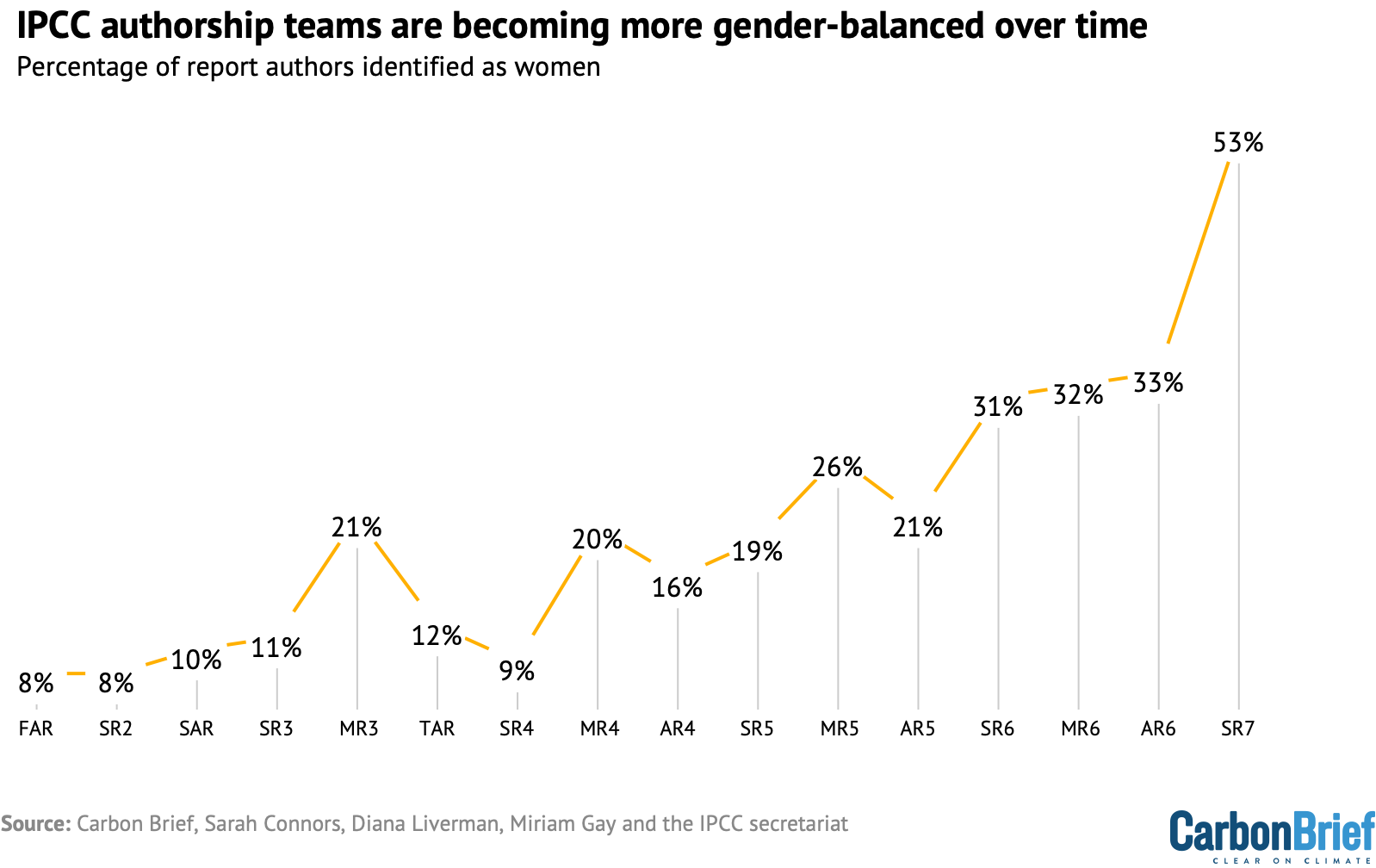
The analysis shows that when the IPCC’s first-ever assessment report was published in 1990, only 8% of authors were women. The representation of women in the IPCC has steadily risen over time and by the sixth assessment cycle (2018-22) more than one-third of authors were women.
The special report on climate change and cities is the only output from the seventh assessment cycle with a publicly available authorship list to date. With 46 men and 51 women, the IPCC cities report is the first in the organisation’s history to have more women than men on its author list.
The IPCC’s seventh assessment cycle – which will include the three main working group reports, one special report and two methodology reports – is likely to have hundreds of authors. The authorship teams for the other reports have not yet been selected.
The graphic below shows a more detailed view. Each dot represents one person – with women shown in orange and men in purple. Where one author contributed to multiple working group reports in the same assessment cycle, these repeats have been removed. Grey dots indicate that the gender of the author could not be determined.
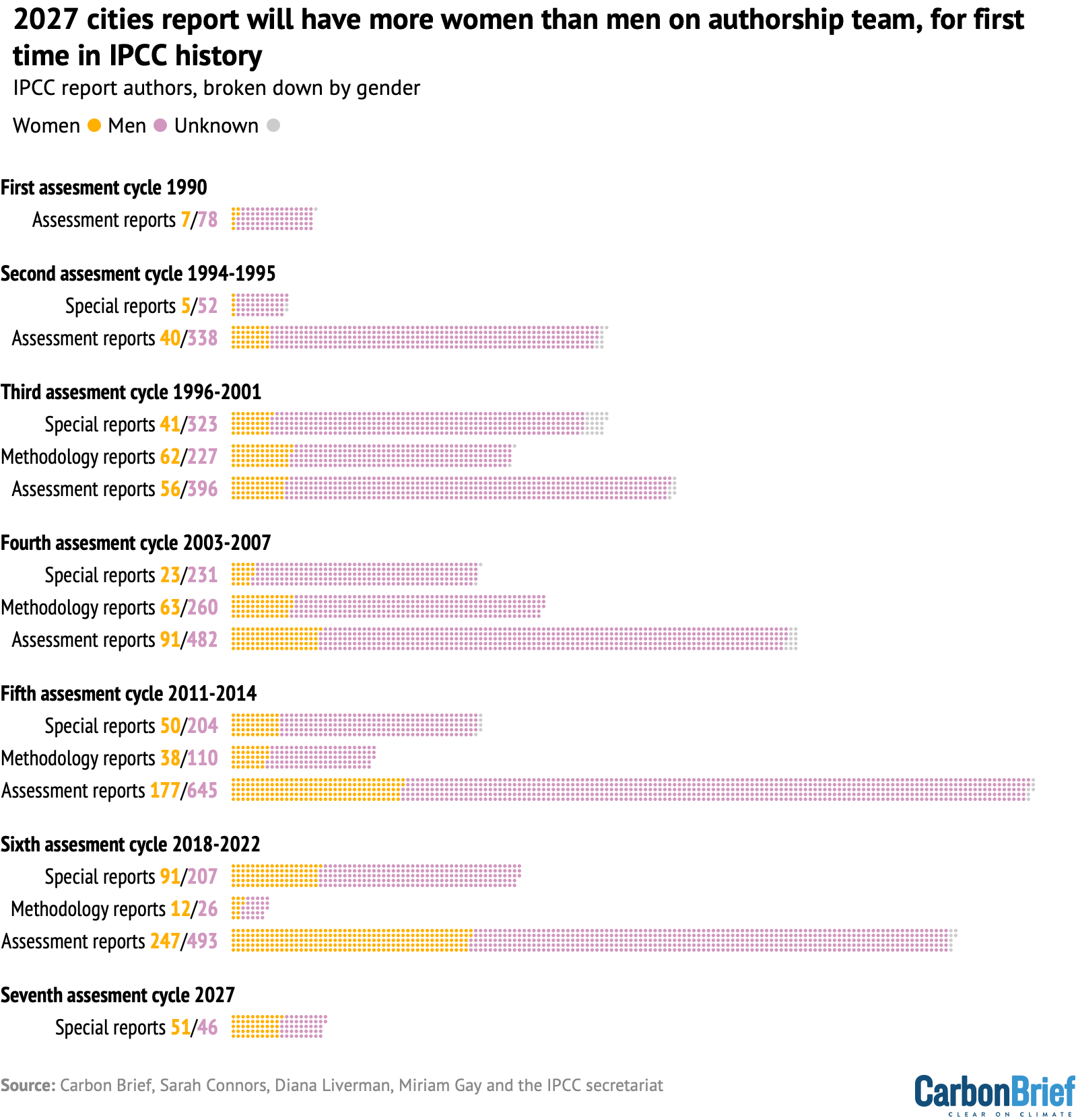
For more information on why gender representation is important in climate science, read Carbon Brief’s 2021 analysis on the lack of diversity in climate science.
Global-south representation
Carbon Brief also analysed how the proportion of IPCC authors from institutions in the global south has changed.
Here, “global south” is defined as countries in Africa, Asia (excluding Japan), Latin America and Oceania (excluding Australia and New Zealand). “Global north” is defined as countries in North America and Europe, as well as Australia, New Zealand and Japan.
The chart below shows the percentage of authors from the global south in every IPCC report.
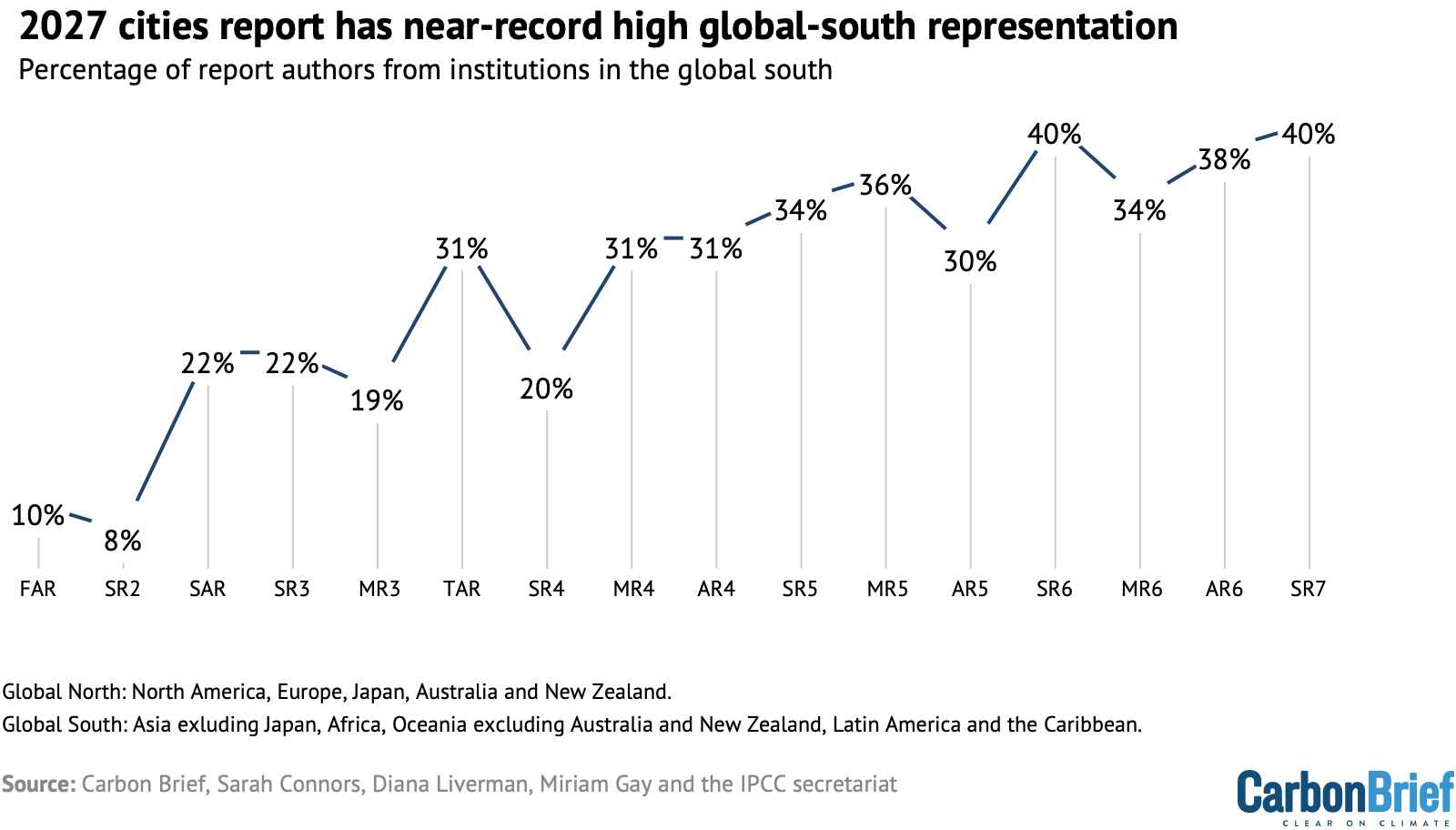
When the IPCC published its first assessment report, only 11% of authors were from institutions in the global south. This percentage has risen over the years, reaching 38% in the sixth assessment reports, the analysis shows.
With 58 authors from institutions in the global north and 39 from the global south, the IPCC’s cities report is the organisation’s fifth-most global south-dominated report.
(The highest-ranking report for global-south authorship, with 53 authors from the global north and 54 from the global south, was the special report on climate change and land. Published in 2019, this was part of the sixth assessment cycle.)
The graphic below shows a more detailed representation of IPCC authors from institutions in the global north and south. Each dot represents one person – with experts from global-south countries shown in dark blue and global-north countries in light blue. Where one author contributed to multiple working group reports in the same assessment cycle, these repeats have been removed.

The upcoming cities report includes authors from institutions in 54 different countries. The most highly represented countries are Japan, the Netherlands, the UK and the US, with six authors each.
The map below shows the number of authors from institutions in each country, across all IPCC reports included in this analysis. The map on the top shows countries in the global north while the map on the bottom shows those in the global south. Darker colours indicate more authors.
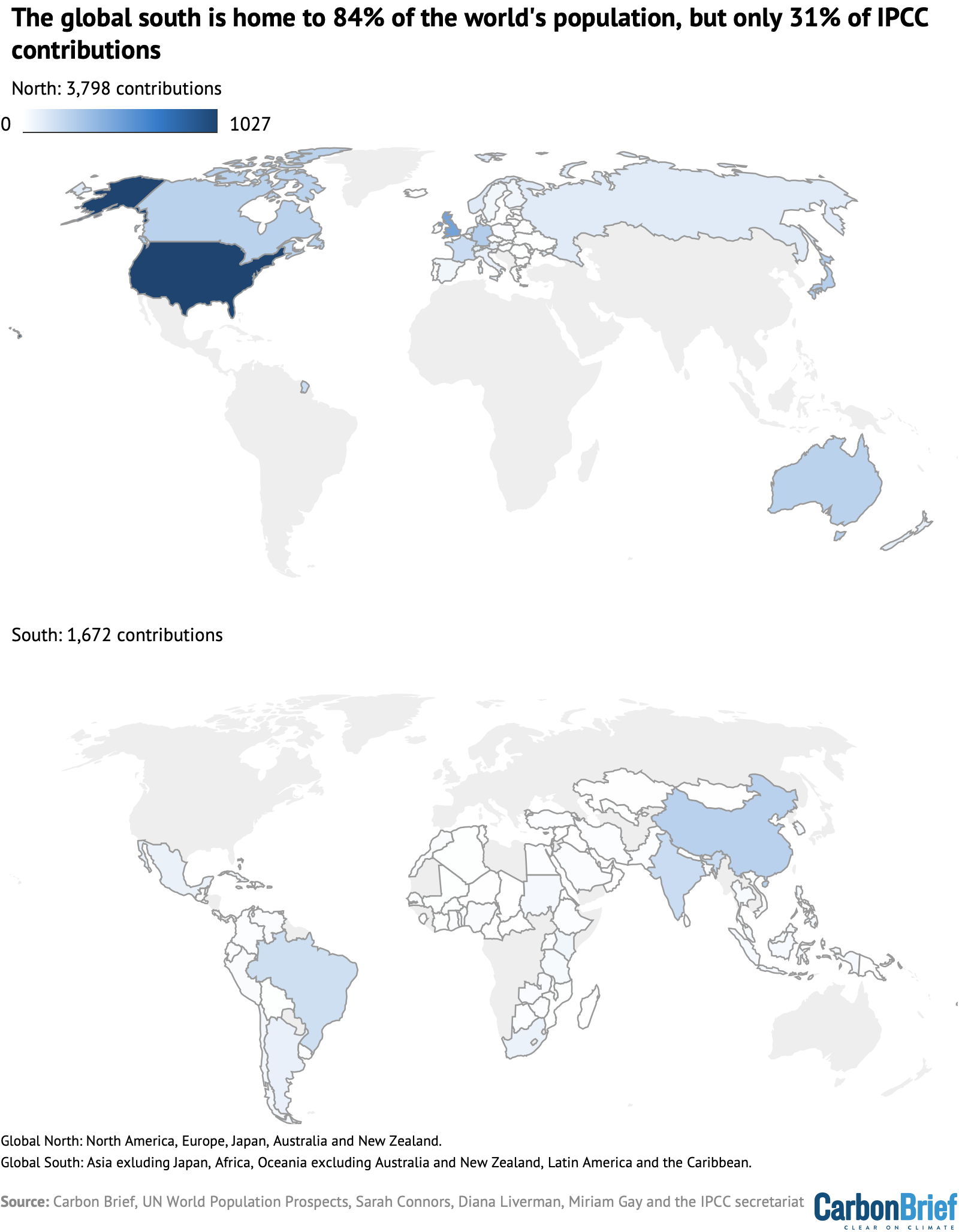
Every author in the cities report has two countries listed next to their name, labelled “country” and “citizenship”. Carbon Brief used the former – which indicates the country where the scientist works – for the analysis above, because citizenship data is not available in earlier reports.
However, IPCC scientists previously told Carbon Brief that, sometimes, experts from the global south find it easier to apply to join the IPCC via institutions in the global north.
An analysis of the citizenship of authors of the IPCC cities report finds that 51 are from global-south countries. However, only 39 are affiliated with institutions in the global south.
Methodology
Carbon Brief obtained data used in this analysis from a range of sources, including the IPCC website, the IPCC’s technical support unit and analysis by Carbon Brief staff.
(The “methodology” section of Carbon Brief’s 2023 analysis on IPCC authorship contains more details on how Carbon Brief collected authorship data from the main working group reports and recent special reports.)
Carbon Brief downloaded authorship data on the AR7 special report on climate change and cities from the IPCC website, which lists data on each author’s gender, citizenship and the country where their institution was based.
For authorship data on all the methodology reports and the special reports published before the fifth assessment cycle, Carbon Brief manually extracted information from the report pdfs, which were accessed on the IPCC archive.
In many early reports, only the initials were given for authors’ first names. In these instances, Carbon Brief used internet searches or a ChatGPT-based tool to find first names. If ChatGPT provided a name, Carbon Brief double-checked its accuracy with internet searches.
Similarly, Carbon Brief used internet searches and ChatGPT to suggest the most likely gender of the authors based on the information available. In some instances, it was not possible to find the authors’ first name or gender and so gender was recorded as “unknown” in the analysis.
Carbon Brief recognises that gender is not best categorised using a binary “male” or “female” label and appreciates that the methods used of determining author gender could result in inaccuracies. However, for the purpose of this analysis, this method was deemed suitable.
As many results were recorded manually, or with the use of artificial intelligence, Carbon Brief acknowledges the possibility of human error. Authorship data collected from earlier reports are more likely to contain these errors. However, the large sample size of more than 5,600 authors in total may mitigate the effect of any such inaccuracies on the overall trends identified.
The post IPCC’s special report on cities is its first with majority-women authorship team appeared first on Carbon Brief.
IPCC’s special report on cities is its first with majority-women authorship team
Climate Change
Satellites Reveal New Climate Threat to Emperor Penguins
Ice loss in the Antarctic Ocean may be killing the sea birds during their molting season.
Each year for millennia, emperor penguins have molted on coastal sea ice that remained stable until late summer—a haven during a span of several weeks when it’s dangerous for the mostly aquatic birds to enter the ocean to feed because they are regrowing their waterproof feathers.
Climate Change
States Sue to Block Trump’s ‘Anti-Science’ Vaccine Policy
Climate change helps spread vaccine-preventable diseases. But the Trump administration’s reduced vaccine schedule “throws science out the window,” and makes Americans more vulnerable to infections, state attorneys general charge in a new lawsuit.
Scientists have long warned that a warming world is likely to hasten the spread of infectious diseases, making vaccination even more critical to safeguard public health.
Climate Change
Hurricane Helene Is Headed for Georgians’ Electric Bills
A new storm recovery charge could soon hit Georgia Power customers’ bills, as climate change drives more destructive weather across the state.
Hurricane Helene may be long over, but its costs are poised to land on Georgians’ electricity bills. After the storm killed 37 people in Georgia and caused billions in damage in September 2024, Georgia Power is seeking permission from state regulators to pass recovery costs on to customers.
-
Greenhouse Gases7 months ago
Guest post: Why China is still building new coal – and when it might stop
-
Climate Change7 months ago
Guest post: Why China is still building new coal – and when it might stop
-

 Greenhouse Gases2 years ago
Greenhouse Gases2 years ago嘉宾来稿:满足中国增长的用电需求 光伏加储能“比新建煤电更实惠”
-
Climate Change2 years ago
Bill Discounting Climate Change in Florida’s Energy Policy Awaits DeSantis’ Approval
-
Climate Change2 years ago
Spanish-language misinformation on renewable energy spreads online, report shows
-

 Climate Change2 years ago
Climate Change2 years ago嘉宾来稿:满足中国增长的用电需求 光伏加储能“比新建煤电更实惠”
-
Climate Change Videos2 years ago
The toxic gas flares fuelling Nigeria’s climate change – BBC News
-

 Carbon Footprint2 years ago
Carbon Footprint2 years agoUS SEC’s Climate Disclosure Rules Spur Renewed Interest in Carbon Credits


